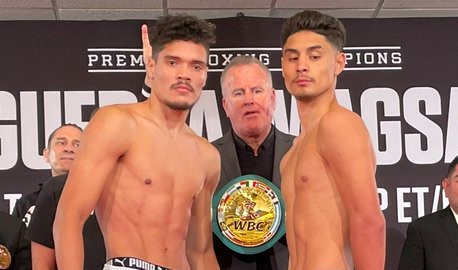By Bryanna Fissori
Boxers have to maintain a consistently healthy diet to perform to their highest potential. This is true for most athletes. If you have watched the movie classic “Rocky,” rest assured that it is not necessary to drink raw eggs. One of the differences between boxers and many other athletes is that they must also maintain weight their within a certain division in order to compete. Heavyweight fighters are the exclusion, as they don’t typically have a top weight cap.
The three components that make up the majority of a standard boxer diet are:
1. Carbohydrates
2. Proteins
3. Fats

Carbohydrates
Carbs are essential for maintaining sufficient energy levels. The correct carbohydrates gradually release energy over the course of the day, replenish depleted glycogenic levels and increase stamina for workouts and competition. Carbs have a negative connotation in the fitness and diet world, but they are essential for a number of things including processing protein. More on protein later, but generally the body requires a 2 to 1 carb to protein ratio to adequately process protein. There is a strong distinction between good carbs and bad carbs, which is based heavily on their effect on blood sugar levels.
Bad (Simple) Carbs
Simple carbs cause notable fluctuations in blood glucose and are considered high glycemic. They assimilate too rapidly which floods the body with excessive amounts of sugar. Insulin is then released to regulate the sugar, which triggers a tired feeling commonly known as a “food coma.” Going to sleep instead of burning off that sugar will result in it being stored as fat.
- Anything with a White/Wheat flour base
- White bread
- Pastries
Good (Complex) Carbs
Carbs that are complex are low on the glycemic index because they have little immediate effect on glucose and insulin levels. They take longer to absorb, which is by they provide long-lasting energy. Complex carbohydrates can also reduce cravings, help in weight loss or maintenance and reduce the chance of diabetes and heart problems.
- Sweet Potatoes
- Beans
- Lentils
- Wholegrain Bread
- Oats and Rice
- Honey
- Fruits and Vegetables
Protein
Protein is crucial to the foundation, construction and care of muscles, which are not only important for training and competition, but also for functioning in daily life. Boxers specifically put a lot of wear and tear on their bodies. Injuries, muscle fatigue and occasional pain are often a factor in a boxer’s overall health.
Protein work to prevent long-term muscle damage through regeneration of cells and tissue as well as increasing muscle mass. Will you get big and bulky and veiny by eating protein? No, that takes a whole other level of training and nutrition, so fear not. In general, nutritionists recommend boxers consume between 35-60% of their daily intake as protein. The large variance is primarily due to the body fat percentage a boxer must maintain to make their specific weight division.
When preparing meat, avoid options for frying or breading in order to achieve the best results. Also remember to have adequate carbohydrates, fiber and hydration levels when consuming higher amounts of protein.
- Lean Chicken
- Fish
- Shrimp
- Eggs
- Lean Beef
- Dairy (Greek yogurt, cottage cheese, cheese)
- Peanut/Almond Butter
- Beans
- Protein Supplements: Whey, Cassin, Hemp, Pea, Rice
Fats
Yep, you read that correctly. Not all fats are created equal and “good” fats are important to a boxer’s diet. Fats help the body maintain energy, promote cell building functions and assists in vitamin and mineral absorption.
Unsaturated fats are usually considered good fats. There are also fats that cannot be made by our bodies and are considered “essential.” Omega-3 and Omega-6 fatty acids can be obtained through proper nutrition and are also important in stimulating brain health. For competitive boxers who take frequent punches to the head, these should be a crucial part of the diet. Even good fats should be consumed in moderation. Some sources of good fats include:
- Seafood
- Olives
- Avocado
- Walnuts
- Almonds
- Flax Seed
- Oils: Macadamia, Coconut or Canola
- Fish oil or Flax oil supplements
Water
Water is not often considered part of a “diet,” but it is absolutely crucial to overall health, weight loss, performance, energy levels and so much more. Your specific hydration needs are dependent on your energy exertion and size, though it is very difficult to drink too much water. We recommend carrying a water bottle with you as often as possible.

Standard Boxer Diet
This is the basic diet that helps most boxers stay in healthy, athletic form. A specific diet will change with each person’s individual needs and goals, just as it changes for boxers as they get closer to competition, depending on their necessary weight loss requirements.
Take a look at your current diet. Are you getting enough protein? Maybe you are getting too much without enough carbohydrates to process it. Do you feel fatigued? Maybe you should add in some good fats. We hope these guidelines help you find the diet that is right for you.

















